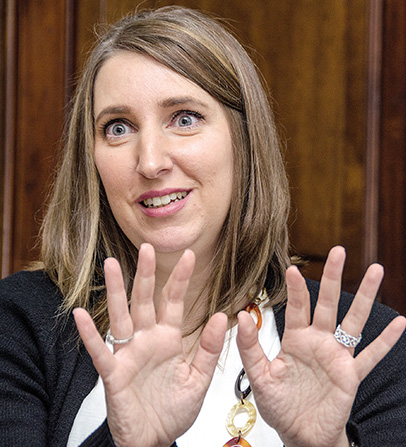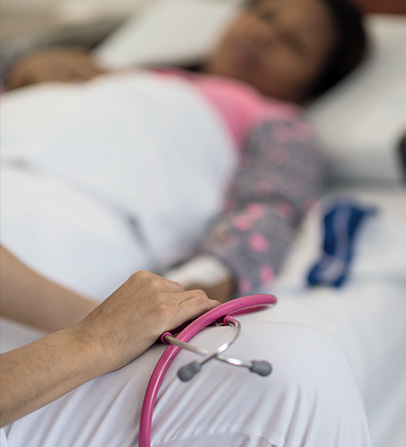Ante fenómenos como la COVID-19, la investigación científica se reconoce como una actividad prior
Por:Inés Elvira Ospina Echandía
Foto:Alberto Sierra, Milagro Castro
Ciencia y tecnología

Por:Inés Elvira Ospina Echandía
Foto:Alberto Sierra, Milagro Castro
El 6 de marzo de 2020 quedará consignado en la historia de Colombia como el día en el que se registró el primer caso de COVID-19 en el país. A partir de esemomento, se puso a prueba la reacción y la eficiencia de entidades públicas y privadas frente a la emergencia de salud pública de la que el mundo no tenía antecedente, al menos en el último siglo. Entre esas primeras organizaciones que pusieron su conocimiento y capacidad al servicio de la sociedad estuvo la Universidad del Rosario, que, gracias a su robusto ecosistema de investigación, pudo reaccionar de manera eficaz y colaborativa en el desarrollo de proyectos que buscan salvar la vida.
La fortaleza en investigación que ya tenía la universidad permitió reaccionar de manera muy rápida ante la crisis generada por la pandemia de la COVID-19 y ponerse al servicio de la sociedad y de las entidades involucradas”, afirma Stéphanie Lavaux, vicerrectora de la Universidad del Rosario hasta julio de 2020 y actual profesora de la Facultad de Estudios Internacionales, Políticos y Urbanos de la institución.
Para Lavaux, el proceso de madurez alcanzado en las últimas dos décadas ha logrado constituir una agenda de investigación muy diversa que permite a los equipos trabajar sobre un abanico de problemáticas con profundidad y seriedad. Esas problemáticas combinan tanto los aspectos de ciencias básicas como de ciencias aplicadas, es decir, una resolución de los problemas que afectan y aquejan a la sociedad en todas las grandes disciplinas en las que se ve involucrada la universidad.
“Esa fortaleza en la investigación ha permitido diversificar el portafolio de temas y fortalecer a los grupos de investigación que ya combinan las miradas desde lo básico y lo aplicado para poder reaccionar frente a las coyunturas de manera muy estructurada y trabajar en los problemas actuales de la sociedad tanto en el país como en el mundo. Esto fue justamente lo que se vio reflejado en este caso de la pandemia”, explica la politóloga Lavaux.
Y es que, a pesar de que la COVID-19 es una enfermedad desconocida para la humanidad, en el Rosario se desarrollaban investigaciones con bases sólidas que permitieron pasar de la teoría a la práctica con la rapidez que exigía la urgencia. Son muchos los ejemplos que se viven a diario en la universidad, en todas las unidades académicas, que muestran la agilidad, la adaptación y la reactividad de los grupos e investigadores para contribuir al entendimiento y aportar su grano de arena a la solución de los problemas relacionados con la pandemia. Uno de esos ejemplos se evidencia con el proyecto de ventiladores mecánicos para apoyo respiratorio, innovación tecnológica basada en una investigación que se realizaba desde la Escuela de Medicina y Ciencias de la Salud (Programa de Ingeniería Biomédica) y que permitió tener lista una propuesta al Gobierno Nacional para el desarrollo del prototipo con unas características únicas, apenas unas semanas después de la llegada del primer caso.
“El hecho de que este ventilador estuviera diseñado para funcionar con paneles solares muestra la sensibilidad social que el Rosario imprime en sus investigadores. Esa combinación de adaptar lo teórico a la realidad es muy importante en un país como Colombia, en donde, para este caso concreto, se debían tener muy presentes las grandes dificultades de fluido eléctrico que existen en algunas regiones. Se trata de poner toda nuestra capacidad científica a disposición de quienes más lo necesiten”, enfatiza Lavaux.
En la Universidad del Rosario los proyectos de investigación se desarrollan en conjunto con otros centros académicos nacionales o internacionales, con un liderazgo compartido, con una apertura total a la colaboración. Las investigaciones involucran siempre otras universidades, centros de investigación, hospitales u organizaciones de la sociedad civil o gubernamentales.
Un paso hacia la política de datos abiertos
“Todavía estamos lejos de la situación ideal en la que todos los datos científicos sean públicos y estén al alcance de todos. Es una cultura que hay que adquirir, pero coyunturas como esta evidencian la importancia de hacerlo. Dimos un paso adelante en algunas comunidades que decidieron trabajar juntas. Fue el caso de la investigación de plasma, en la que se liberaron datos científicos que permitieron avanzar y compartir los hallazgos. Este proyecto mostró una apuesta de datos abiertos de una co munidad científica mundial”, asegura Lavaux.
En el mismo sentido, se dio el proyecto Coronamonitor Colombia. Es un verdadero proyecto de ciencia ciudadana que, por medio de un cuestionario virtual de seguimiento a la evolución de la enfermedad en los contagiados y a las con diciones de aislamiento preventivo de la población, pretende generar información con alta frecuencia y precisión geográfica. Su objetivo es diseñar herramientas, como mapas con georre ferenciación de casos e identificar rutas de prevención y aten ción. La iniciativa fue creada por la Universidad Eafit y apoyada por la Universidad del Rosario e Innovations for Poverty Action, entre otras entidades.

Stéphanie Lavaux, politóloga y académica de la Universidad del Rosario, asegura: “No se puede perder ni un momento en todo el tiempo que se debe dedicar a la investigación. Esta pandemia mostró cómo las circunstancias pueden cambiar de forma repentina y el estar preparados en investigación científica, es decir, tener esta actividad como algo prioritario y no secundario, permite reaccionar de manera inmediata. No es ningún capricho intelectual, la ciencia realmente ofrece soluciones a la sociedad, que en muchos casos involucra supervivencia”.
“La coyuntura permitió que las comunidades compartieran datos sinceros. Claro, aún estamos lejos de tener una comunidad científica que abra los datos de manera permanente, porque para ello hace falta perder el miedo. Pero en una crisis siempre hay dos caminos: el egoísmo puro y duro o la colaboración incondicional y abierta. En este caso, las universidades colombianas dimos ejemplo y escogimos ese segundo camino. Ganamos décadas de trabajo arduo para convencernos mutuamente de que el camino era la colaboración. Esta crisis nos ha hecho mucho más cercanas, nos ha hecho compartir equipos de investigación, técnicos y tecnológicos, laboratorios, incluso recursos financieros y espacios de formación. También protocolos y buenas prácticas. Esta es sin duda una de las grandes lecciones positivas a capitalizar”, explica.
Lo vivido hasta el momento por la emergencia de salud pública por la COVID-19 deja varias lecciones aprendidas. La primera de ellas es la importancia que tiene la investigación, especialmente en un país como Colombia. Así lo expresa la profesora Lavaux: “No se puede perder ni un momento en todo el tiempo que se debe dedicar a la investigación. Esta pandemia mostró cómo las circunstancias pueden cambiar de forma repentina y el estar preparados en investigación científica, es decir, tener esta actividad como algo prioritario y no secundario, permite reaccionar de manera inmediata. No es ningún capricho intelectual, la ciencia realmente ofrece soluciones a la sociedad, que en muchos casos involucra supervivencia”.
Una segunda lección está en que la investigación no desconozca la realidad y siempre busque el bienestar colectivo. Según la directiva, esa es la identidad rosarista que se refleja en toda la agenda investigativa. Es lo que permite a los científicos definir los temas prioritarios y lo que el rector, Alejandro Cheyne, denomina ‘el bien común’, es decir, la ganancia colectiva.

A pesar de que la COVID-19 es una enfermedad desconocida para la humanidad, en el Rosario se desarrollaban investigaciones con bases sólidas que permitieron pasar de la teoría a la práctica con la rapidez que exigía la urgencia.
Investigar por décadas bajo esa mirada esuna de las fortalezas que permitió una reacción inmediata ante la coyuntura, pues los investigadores de la universidad no dudaron ni un segundo en poner su agenda de investigación en todas las disciplinas al servicio de la lucha colectiva contra la pandemia, tanto a nivel nacional como regional. Grupos y centros de investigación de todas las facultades y escuelas desarrollaron proyectos de gran impacto para los colombianos.
“Lo tercero para destacar está en tener un sistema de gestión robusto y funcionando de manera pragmática, porque una cosa es tener listo todo en los laboratorios y otra es brindar un apoyo para apalancar la innovación y la transferencia hacia la sociedad. El Rosario estaba preparado y de esta manera pudo acelerar sus investigaciones para obtener recursos y lograr, por ejemplo, un cruce entre inversión institucional y donación del sector privado para impulsar esas agendas de investigación”, afirma Lavaux
El ecosistema de investigación de la universidad permite a sus científicos dedicar su tiempo y esfuerzo a proyectos, sin preocuparse de cómo conseguir los recursos, los apoyos o los socios nacionales e internacionales para continuar.
Este último punto, que hace referencia al trabajo colaborativo, es el cuarto factor que destaca la experta como uno de los aciertos de la universidad. “Nuestros investigadores no están aislados, tienen redes muy sólidas de colaboración con otros equipos científicos en el mundo. El ser parte de una comunidad más amplia les brinda oportunidades excepcionales de trabajo en equipo y visibilidad”, afirma.
La reafirmación de que la apuesta por la investigación de la universidad es de gran importancia llena de satisfacción a la institución y la impulsa a seguir fortaleciendo los diferentes grupos de investigación.
“Todos los proyectos tienen sus ritmos y cronogramas, pero sin importar cuáles sean, la primera responsabilidad de la universidad es acompañar estos proyectos. Por eso, el primer reto está en agilizar aún más los procesos, porque varios son proyectos que se deben desarrollar en pocos meses y tienen un impacto directo y rápido en la sociedad, lo que no resulta tan fácil para una máquina pesada como una universidad. Sin embargo, la experiencia vivida en este momento, el saber cómo responder, no se puede quedar solo en la coyuntura, sino que hay que incorporar estas lecciones aprendidas en el quehacer diario para el futuro”, afirma Stéphanie Lavaux.
Aunque la suerte de estos proyectos dependerá mucho de cómo avancen los hallazgos científicos en el mundo y de la ruta que tome la pandemia a nivel regional, nacional e internacional, la universidad incorporará todo lo aprendido durante esta coyuntura, tanto en gestión como en resultados. Sin duda, lo vivido servirá para que los grupos de investigación desarrollen agendas más robustas que permitan una reacción cada vez más ágil ante fenómenos como la COVID-19, que ataquen la vida a nivel global y particular.
“Ojalá esto también haya servido para que los colombianos se hayan dado cuenta del poder de la ciencia, de la importancia de los científicos que tenemos y de que estén insertados en redes internacionales de primer nivel. Esto mostró a Colombia como un país que aporta. Además, se debe aprovechar lo ocurrido para que estos resultados incentiven en los jóvenes el gusto por la ciencia y vean con claridad que no se trata de un científico de laboratorio sin contacto con la realidad, sino que se entienda que la ciencia realmente salva al mundo”, concluye la exvicerrectora académica de la Universidad del Rosario.